Almaty, a captivating city nestled in the heart of Kazakhstan, is a melting pot of rich history, vibrant culture, and burgeoning progress. Its journey through time has shaped its identity, from its humble beginnings as a trading hub to its present-day status as a thriving metropolis. Almaty stands as a testament to the enduring spirit of its people and the boundless potential that lies within.
From its towering mountains to its bustling streets, Almaty offers a symphony of experiences. The city’s diverse cultural heritage is reflected in its art, architecture, and cuisine, while its economic prowess is evident in its modern skyline and thriving business community. As we delve into the tapestry of Almaty, we will uncover its captivating story and explore the many facets that make it a truly extraordinary destination.
Almaty’s Historical Significance
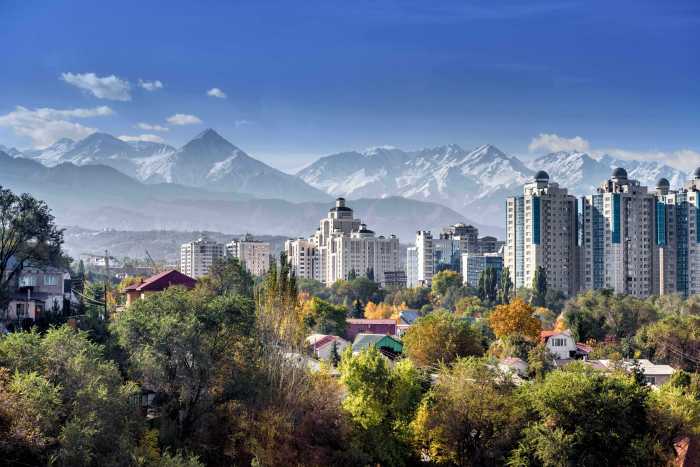
Almaty, formerly known as Verny and Alma-Ata, has a rich and diverse history spanning over centuries. The city’s strategic location at the foothills of the Tian Shan mountains made it a natural hub for trade and cultural exchange.
In the 18th century, Almaty became a major trading center on the Silk Road, connecting East and West. Merchants from China, Central Asia, and Russia flocked to the city, bringing with them goods and ideas that shaped Almaty’s cultural landscape.
Almaty, a vibrant city nestled in the foothills of the Tien Shan Mountains, offers a unique blend of urban charm and natural beauty. However, for those seeking a relaxing beach holiday, Almaty may not be the ideal destination. If you plan on embarking on a beach getaway, it’s crucial to consult a beach holiday packing list to ensure you have everything you need for a comfortable and enjoyable experience.
While Almaty may not boast sandy shores, its rich cultural heritage and stunning natural surroundings make it a worthwhile destination for travelers seeking a different kind of adventure.
Soviet Rule
The Russian Empire annexed Almaty in 1864 and renamed it Verny. The city’s population grew rapidly during this period, as it became a center for Russian settlement and administration in Central Asia.
After the Russian Revolution in 1917, Verny became the capital of the Kazakh Autonomous Soviet Socialist Republic. The city was renamed Alma-Ata in 1921 and remained the capital of Kazakhstan until the country’s independence in 1991.
During the Soviet era, Alma-Ata underwent significant industrialization and urbanization. The city became a major center for heavy industry, food processing, and scientific research.
Almaty’s Geographical Features
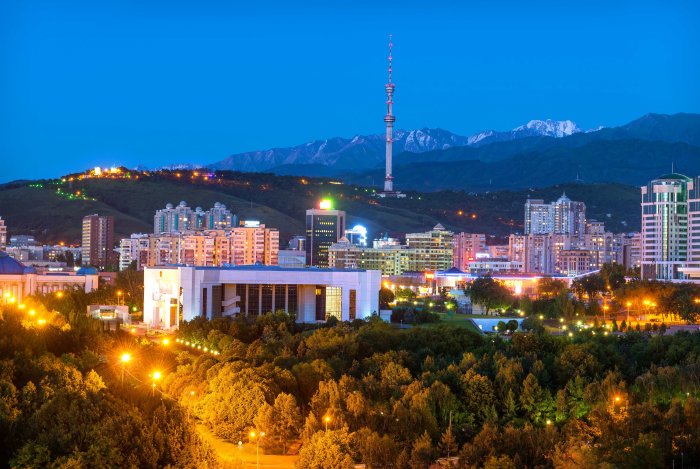
Almaty is located in southeastern Kazakhstan, at the foothills of the Trans-Ili Alatau mountains. It covers an area of 683 square kilometers (264 square miles) and has a population of over 1.9 million people.
The city is divided into eight districts: Almaly, Auezov, Bostandyk, Medeu, Nauryzbai, Turksib, Zhetysu, and Zhetisu.
Geographical Data
| Characteristic | Value |
|---|---|
| Elevation | 700-950 meters (2,300-3,120 feet) |
| Area | 683 square kilometers (264 square miles) |
| Population | 1.9 million |
| Districts | 8 |
Natural Surroundings
Almaty is surrounded by the Trans-Ili Alatau mountains to the south and the Ile River to the north. The mountains provide a stunning backdrop to the city, and the river is a popular spot for swimming, fishing, and boating.
The city is also home to a number of parks and gardens, including the Central Park, the Botanical Garden, and the Zoo. These green spaces provide a much-needed respite from the hustle and bustle of city life.
Map of Almaty
[Provide a detailed map of Almaty, highlighting significant landmarks and neighborhoods.]
Almaty’s Cultural Landscape
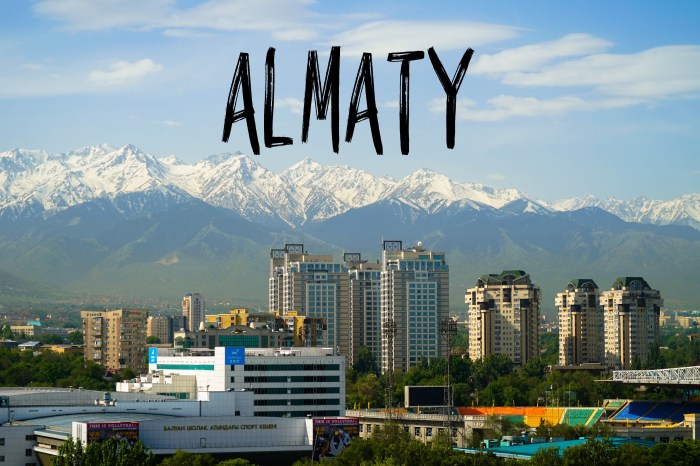
Almaty is a melting pot of cultures, with a diverse heritage that spans centuries. The city’s cultural landscape is a vibrant tapestry woven with influences from its Kazakh, Russian, and Soviet past.
Art Scene
Almaty is home to a thriving art scene, with numerous museums, theaters, and galleries showcasing a wide range of artistic expressions. The State Museum of Arts of the Republic of Kazakhstan houses an extensive collection of Kazakh and international art, while the A. Kasteyev Museum of Arts features works by renowned Kazakhstani artists. The city also boasts several contemporary art galleries, such as the Tselinnyy Gallery and the Ular Gallery, which promote emerging local and international artists.
Traditional Kazakh Culture
Traditional Kazakh culture plays a significant role in shaping Almaty’s identity. The city is home to several cultural centers and organizations that preserve and promote Kazakh traditions. The Kazakh National Academic Opera and Ballet Theater showcases traditional Kazakh dance and music, while the Central State Museum of Kazakhstan exhibits artifacts and exhibits that tell the story of Kazakh history and culture. Visitors can also experience traditional Kazakh cuisine at numerous restaurants throughout the city, offering dishes such as beshbarmak, lagman, and kuyrdak.
Almaty’s Economic Profile
Almaty is the economic hub of Kazakhstan, contributing significantly to the country’s GDP and overall economic development. The city boasts a diverse and vibrant economy with a strong presence in various industries, including finance, technology, tourism, and manufacturing.
Economic Strengths
Almaty’s economic strengths lie in its strategic location, skilled workforce, and robust infrastructure. The city is a major transportation hub, connecting Kazakhstan to neighboring countries and facilitating trade and commerce. Almaty also has a highly educated and experienced labor force, making it an attractive destination for businesses seeking skilled professionals.
Industries
Almaty’s economy is primarily driven by the following industries:
- Finance: Almaty is the financial center of Kazakhstan, housing the headquarters of major banks and financial institutions.
- Technology: The city is a hub for IT and telecommunications companies, with a growing startup ecosystem.
- Tourism: Almaty’s natural beauty and cultural attractions make it a popular tourist destination.
- Manufacturing: The city has a significant manufacturing sector, producing a wide range of goods, including food, beverages, and machinery.
Comparison to Other Major Cities
Compared to other major cities in Kazakhstan, Almaty has a more diversified economy and a higher GDP per capita. The city’s economic performance has been consistently strong, outperforming other regional centers in terms of growth and development.
Opportunities for Growth
Almaty has significant opportunities for economic growth and investment in the following areas:
- Renewable Energy: The city has a potential for developing renewable energy sources, such as solar and wind power.
- Tourism: Almaty can further capitalize on its tourism potential by developing new attractions and improving infrastructure.
- Technology: The city can continue to support its growing tech industry by investing in research and development.
Almaty’s Urban Planning and Architecture
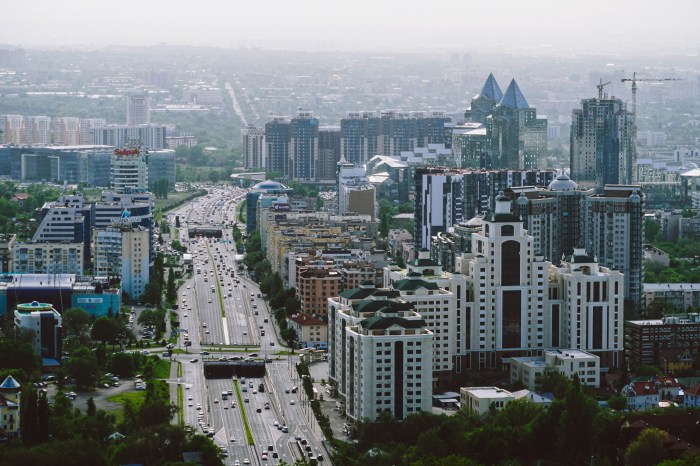
Almaty, formerly known as Alma-Ata, is the largest city in Kazakhstan and serves as its cultural and economic hub. The city’s urban planning and architectural development have been influenced by various factors, including its rich history, diverse cultural heritage, and geographical location.
Urban Planning and Development Strategies
Almaty’s urban planning strategies have evolved over time, reflecting the city’s growth and changing needs. The city’s current urban planning approach emphasizes sustainable development, with a focus on improving the quality of life for its residents. This includes promoting compact, mixed-use development, enhancing public transportation, and creating green spaces and recreational areas.
Architectural Styles and Landmarks
Almaty’s architectural landscape showcases a blend of traditional and modern styles. The city’s skyline is dominated by high-rise buildings, including the Esentai Tower, the tallest building in Central Asia. However, Almaty also retains many historic buildings, such as the Central State Museum of Kazakhstan and the Ascension Cathedral.
Sustainable Urban Development Initiatives
Almaty has implemented several sustainable urban development initiatives, including:
- Promoting energy efficiency through building codes and incentives.
- Developing a comprehensive public transportation system.
- Creating green spaces and parks, including the Central Park of Culture and Recreation.
- Implementing waste management and recycling programs.
Almaty’s Transportation and Infrastructure
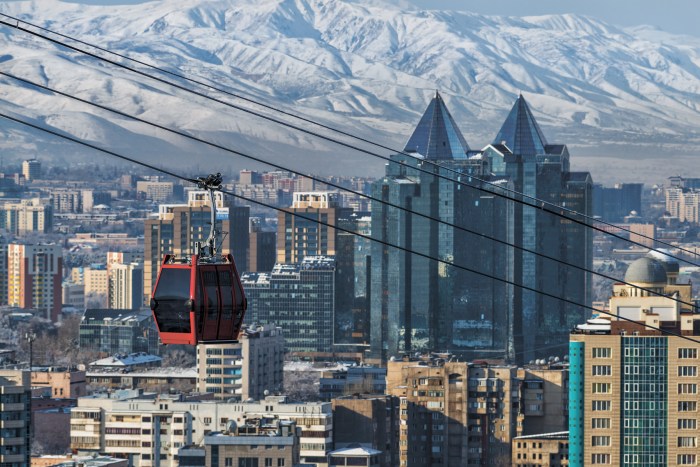
Almaty is a well-connected city with a comprehensive transportation system that caters to both local and international travelers. The city’s transportation infrastructure includes an international airport, a railway station, and a network of roads and highways. Almaty is also home to a modern public transportation system that includes buses, trolleybuses, and a metro system.
Transportation Options
The following table Artikels Almaty’s transportation options:
| Mode of Transport | Description |
|—|—|
| Air | Almaty International Airport (ALA) is located 18 kilometers northeast of the city center. It is the largest airport in Kazakhstan and serves as a hub for Air Astana, the national airline. |
| Rail | Almaty Railway Station is located in the city center and serves as a major hub for rail travel in Kazakhstan. The station is connected to major cities across the country, including Astana, Shymkent, and Karaganda. |
| Road | Almaty is connected to other cities in Kazakhstan and neighboring countries by a network of roads and highways. The city is also home to a number of bus stations that serve both domestic and international destinations. |
Infrastructure
Almaty’s infrastructure is well-developed and provides a high quality of life for residents. The city has a reliable supply of electricity, water, and telecommunications services. Almaty is also home to a number of hospitals, schools, and other public institutions.
Public Transportation
Almaty’s public transportation system is efficient and accessible. The city’s metro system consists of nine lines and 46 stations, and it is one of the most modern metro systems in Central Asia. The city also has a network of buses and trolleybuses that serve all parts of the city. Public transportation fares are affordable, and there are a number of discounts available for students, seniors, and other groups.
Almaty’s Educational Institutions and Research Centers
Almaty is a prominent hub for higher education and scientific research in Kazakhstan. The city is home to numerous universities and research institutions that contribute to its vibrant academic and intellectual landscape.
Universities
Almaty boasts a wide range of universities offering undergraduate, graduate, and doctoral programs. Some of the most notable institutions include:
- Al-Farabi Kazakh National University
- Kazakh National Technical University
- Kazakh National Medical University
- Kazakh National Pedagogical University
- Kazakh University of Economics and Law
These universities are recognized for their high academic standards, research capabilities, and international collaborations. They offer a diverse range of programs in fields such as science, engineering, medicine, humanities, and social sciences.
Research Institutions
In addition to its universities, Almaty is home to several renowned research institutions. These include:
- Institute of Nuclear Physics
- Institute of Mathematics and Mechanics
- Institute of Chemical Sciences
- Institute of Geology and Geophysics
- Institute of Oriental Studies
These institutions conduct cutting-edge research in various scientific disciplines and contribute significantly to the advancement of knowledge in Kazakhstan and beyond.
Notable Achievements, Almaty
Almaty’s academic community has made significant contributions to various fields of research. Notable achievements include:
- Development of new medical technologies and treatments
- Advancements in nuclear physics and particle accelerators
- Discoveries in geology and mineral exploration
- Innovative solutions in computer science and artificial intelligence
- Groundbreaking research in linguistics and cultural studies
Almaty’s educational institutions and research centers continue to play a vital role in shaping the city’s intellectual and cultural landscape. They attract talented students and researchers from across Kazakhstan and the world, contributing to the city’s reputation as a hub for innovation and progress.
Almaty’s Tourism and Hospitality Industry
Almaty is a vibrant city with a rich history and culture, making it a popular tourist destination. The city boasts numerous attractions, including historical landmarks, museums, and natural wonders.
The hospitality industry in Almaty is well-developed, with a wide range of hotels, restaurants, and tour operators. The city also has a strong infrastructure, including an international airport and a modern transportation system.
Almaty is a city in Kazakhstan, known for its beautiful mountains and natural scenery. If you’re looking for a great hiking experience, be sure to check out the best hiking trails in the US. These trails offer stunning views, challenging terrain, and a chance to get away from the hustle and bustle of city life.
Whether you’re a beginner or an experienced hiker, you’re sure to find a trail that’s perfect for you in Almaty.
Top Tourist Attractions
| Attraction | Description |
|---|---|
| Medeo | A high-altitude skating rink located in the mountains just outside of Almaty. |
| Kokshetau National Park | A beautiful park with forests, lakes, and mountains, located about 200 kilometers from Almaty. |
| Central State Museum of Kazakhstan | A museum that houses a collection of artifacts from Kazakhstan’s history and culture. |
| Green Bazaar | A bustling market where you can find everything from fresh produce to traditional crafts. |
| Almaty Tower | A tall tower that offers panoramic views of the city. |
Tourism is a major economic driver for Almaty. The city attracts both domestic and international tourists, who contribute to the local economy by spending money on hotels, restaurants, and other services.
Almaty’s Healthcare System and Social Welfare
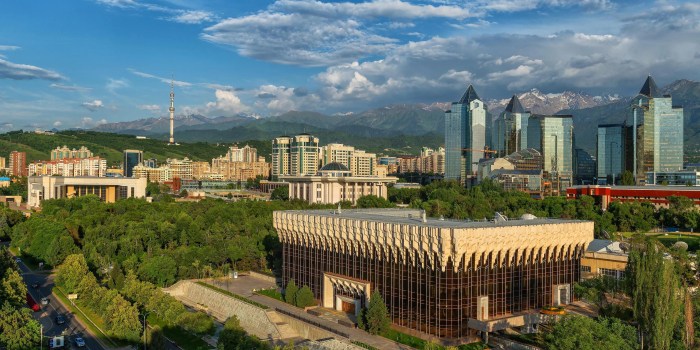
Almaty boasts a well-developed healthcare system that provides comprehensive medical services to its residents. The city has numerous hospitals, clinics, and specialized medical centers offering a wide range of treatments and procedures.
Almaty, the largest city in Kazakhstan, is a vibrant metropolis nestled in the foothills of the Tien Shan Mountains. With its diverse culture, stunning architecture, and picturesque landscapes, Almaty is a must-visit destination for any traveler seeking an unforgettable experience.
For those planning their 2024 travels, be sure to check out best travel destinations 2024 to learn more about this incredible city and its many attractions.
The healthcare system in Almaty is accessible to all residents, regardless of their income or social status. The city has implemented universal health insurance, which covers a significant portion of medical expenses for all citizens. This ensures that everyone has access to essential healthcare services, including preventive care, vaccinations, and emergency treatment.
Social Welfare Programs and Initiatives
In addition to its healthcare system, Almaty has a range of social welfare programs and initiatives designed to support vulnerable populations and address social issues.
- The city provides financial assistance to low-income families, the elderly, and individuals with disabilities.
- Almaty has a network of social service centers that offer counseling, support groups, and other services to individuals and families facing challenges.
- The city also runs several programs aimed at reducing poverty and inequality, such as job training programs, affordable housing initiatives, and food assistance programs.
Almaty’s Environmental Challenges and Initiatives
Almaty faces several environmental challenges, including air and water pollution, waste management, and deforestation. The city has taken significant steps to promote environmental sustainability, such as implementing green building codes, expanding public transportation, and increasing recycling efforts.
Air Pollution
- Air pollution is a major concern in Almaty, primarily due to vehicle emissions and industrial activities.
- The city has implemented measures such as promoting the use of electric vehicles, encouraging carpooling, and introducing stricter emission standards for vehicles.
Water Pollution
- Water pollution is another significant challenge, primarily caused by industrial wastewater discharge and agricultural runoff.
- Almaty has invested in wastewater treatment plants and implemented water conservation measures to reduce water pollution.
Waste Management
- Waste management is a key environmental issue in Almaty, with the city generating a large amount of waste.
- The city has implemented waste sorting programs, increased recycling efforts, and established landfills to manage waste.
Deforestation
- Deforestation is a growing concern in the Almaty region, primarily due to urbanization and agricultural expansion.
- The city has implemented reforestation programs and protected natural areas to conserve forests.
Final Thoughts
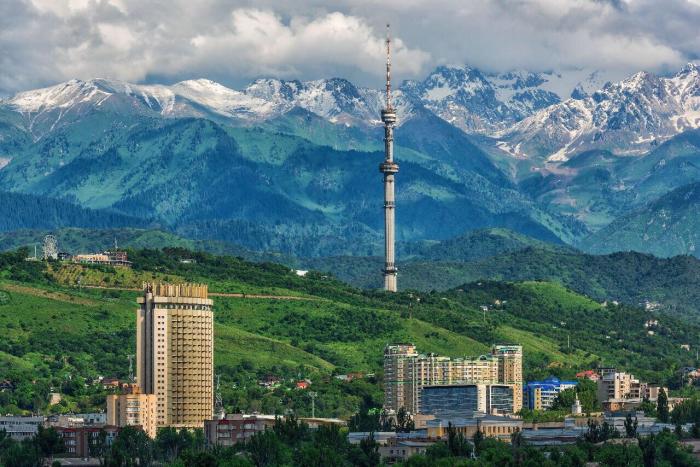
As we bid farewell to Almaty, we carry with us a profound appreciation for its rich tapestry of history, culture, and progress. This vibrant city has left an indelible mark on our hearts, inspiring us with its resilience, creativity, and unwavering optimism. Almaty stands as a beacon of hope and possibility, reminding us that even in the face of adversity, human spirit can prevail and thrive.
FAQ Section
What is Almaty known for?
Almaty is renowned for its stunning natural beauty, rich cultural heritage, and modern architecture. It is also a major economic and financial center in Central Asia.
What is the best time to visit Almaty?
The best time to visit Almaty is during the spring (April-May) or autumn (September-October) when the weather is pleasant and mild.
Is Almaty safe for tourists?
Yes, Almaty is generally considered a safe city for tourists. However, as with any major city, it is always advisable to take precautions and be aware of your surroundings.